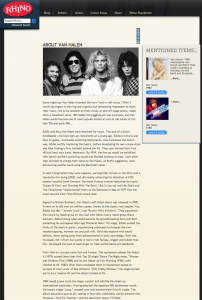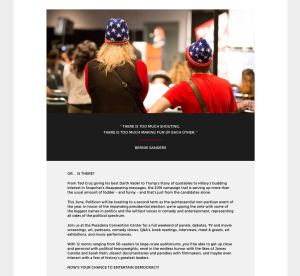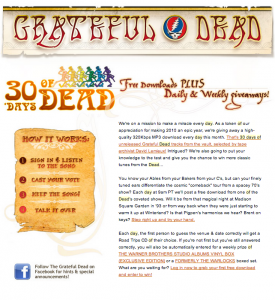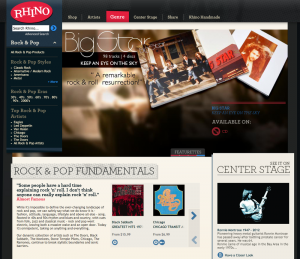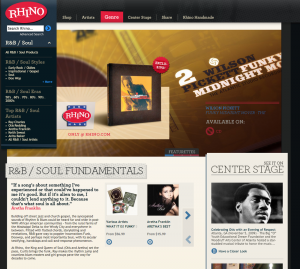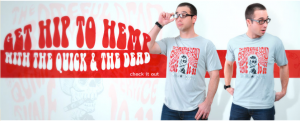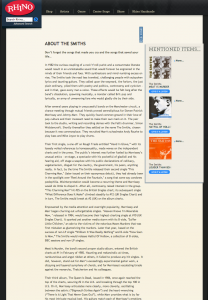Some might say Van Halen invented the term “rock’n’roll circus.” With 3 revolving singers in the ring and a genius but demanding ringmaster at helm, their music, not to be outdone by their unruly on and off stage antics, made them a household name. Ultimately the juggling act was a success, and Van Halen would become one of most popular American rock & roll bands of the late’70s and early’80s.
Eddie and Alex Van Halen were destined for music. The sons of a Dutch bandleader, the boys took up instruments at a young age, Eddie on drums and Alex on guitar, eventually switching instruments. How fortuitous the switch was, Eddie swiftly mastering the basics, before developing his own unique style and Alex finding a firm foothold behind the kit. They soon formed their first official hard rock band, Mammoth. By 1974, the line-up would be solidified with David Lee Roth providing vocals and Michael Anthony on bass. Soon after they decided to change their name to Van Halen, at Roth’s suggestion, upon discovering another band using the Mammoth name.
It wasn’t long before they were regulars, earning their stripes on the Strip and a reputation for being LOUD, and ultimately attracting the attention of KISS bassist/vocalist Gene Simmons. He would finance a demo featuring the tracks “House Of Pain” and “Running With The Devil.” But it was not until Mo Ostin and Ted Templeman “rediscovered” them at the Starwood in May of 1977 that the band secured their first official record deal.
Signed to Warner Brothers, Van Halen’s self-titled debut was released in 1978. It went on to sell over six million copies, thanks to the classic rock staples “You Really Got Me,” “Jamie’s Cryin’,” and “Runnin’ With the Devil.” They supported the record by heading out on the road with fellow heavy metal group Black Sabbath, Eddie honing what would become his groundbreaking form and Roth unleashing his outrageous alter ego “Diamond Dave.” On stage, Eddie pushed the limits of the electric guitar, popularizing underused techniques like two-handed tapping, hammer-ons and pull-offs. He’d also explore with sound effects, never shying away from advancements in sonic technology. Roth was his equal, not in form but surely in rock’n’roll fantasy, bigger and bolder than life. He played the part of lead singer to “near-performance art standards.”
From then on, success came fast and furious. The sophomore release Van Halen II (1979) scored them their first Top 20 single “Dance The Night Away.” Women and Children First (1980) and its the follow-up Fair Warning (1981) both charted at #6. 1982′s Diver Down escalated them to mainstream status on account of their cover of Roy Orbison’s “(Oh) Pretty Woman.” The single turned out to be a massive hit and the album landed at #3.
1984 would prove to be the magic number and solidify Van Halen as international superstars. Having adopted the signature 80s synthesizer sound, the band’s single “Jump,” crossed-over and became their first #1 single. The album secured a spot at #2, reeling in fans with undeniably catchy anthems like “Panama,” “Hot For Teacher,” and the electronic heavy “I’ll Wait.”
But as with those that came before them, and those that would follow, the age-old problem of band tensions began to arise. Roth would take time off to record a solo EP, Crazy from the Heat, turning up his over-the-top antics on classic covers of “California Girls” and “Just a Gigolo/I Ain’t Got Nobody.” This excursion would delay the recording of 1984′s follow-up. Eddie had had enough. Dave was out.
Enter Sammy Hagar. The one time singer of Montrose had a successful solo career; he’d proven his arena metal worth with songs like “Three-Lock Box” and “I Can’t Drive 55.” Skeptics scoffed at the Hagar take over, but Van Halen forged on, in some ways with more success than ever. “Van Hagar” would quickly become crowned kings of the chart, securing the #1 spot with their next 4 records.
1986′s 5150, scored a trio of hit singles “Why Can’t This Be Love,” “Dreams,” and “Love Walks In.” 1988′s OU812 followed with chart-toppers like the power ballad “When It’s Love” and the country-esque “Finish What Ya Started.” For Unlawful Carnal Knowledge, released in 1991, had a runaway hit on MTV with the video for “Right Now.” Their first live record, the double album Van Halen Live: Right Here, Right Now (1993) also went straight to #1.
By the time they released their tenth studio album, Balance, the fourth with Hagar, tensions would creep up again. This time due to arguments over what would be on an impending Greatest Hits, and among other things, due to the fact that Eddie was trying to get sober and Hagar was still a hard-partying machine (he would eventually launch his own brand of tequila). Unbeknownst to Hagar, Van Halen brought Roth back into the studio to record. The public was shocked and so was Hagar but the real foil was Roth who would be let go once again after working on just 2 songs.
Enter former Extreme vocalist Gary Cherone. The sole Cherone effort, Van Halen III, would go down as the lowest-selling album of Van Halen’s career. He was promptly dismissed.
After a lengthy hiatus, Van Halen would put all their issues aside and re-group with Hagar for an American tour in support of a greatest-hits collection, The Best of Both Worlds. The title was a nod to the 2 singers and the album features 16 Roth-era songs 17 Hagar-era songs and a handful of new Hagar tracks.
In 2007, after Van Halen were inducted into the Rock & Roll Hall of Fame, rumors surfaced of Roth reunion tour. Those rumors were confirmed when the group announced their plan to tour not only Roth but with Eddie’s son Wolfgang on bass. The tour went on to become the band’s highest grossing tour ever, bringing in 93 million dollars.
